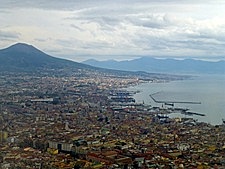Naples: 9th World Conference on Bioethics, Medical Ethics and Health Law
9th World Conference on Bioethics, Medical Ethics and Health Law
Naples, Italy to Taipei, Taiwan. Some Neapolitans believe that their city is a piece of heaven that fell to earth. If this is true then the (toxic) waste scandals which have been going on for years in Naples may make us reconsider where we wish to live out eternity.

Thanks to the support of several of Naples’ universities, the “UNESCO Chair in Bioethics 9th World Conference on Bioethics, Medical Ethics and Health Law” was held in Italy from November 19-21, 2013. With about 1300 participants attending, it was far larger than the previous conferences of this series.
The WMA has already sponsored the World Conference on Bioethics in the past, but this year we took an active part in structuring the program. In two WMA lead sessions chaired by our Past-President, Dr. Yoram Blachar and the WMA Secretary General we were able to address some of our association’s major policies, namely the “Declaration of Helsinki – Ethical Principles for Medical Research Involving Human Subjects” (DoH) and the “Declaration of Malta on Hunger Strikers”. In the first session on the DoH our ethics advisor Jeff Blackmer and our legal counsel Annabel Seebohm reported on the development of the declaration and explained the most recent changes enacted with the 2013 Fortaleza version, as well as outlining the historical development of the scope of the declaration and the protections it offers.
During the second session, Associate Member and former ICRC expert Hernan Reyes, ethics advisor Vivienne Nathanson, as well as the Israeli Medical Association’s legal counsel Malke Borrows and IsMA expert Tami Karni reported on the medical, legal and ethical questions surrounding the issue of hunger strikers, explaining the guidance set out in the Malta Declaration and outlining practical approaches on how to deal with hunger strikers.
It was very encouraging that many of the presentations at this conference – and I am not now only referring to those delivered during the WMA lead sessions – referenced WMA policy. This underlines not only the value of the work we are doing, but also the necessity to connect back to this group of professionals because questions regarding the interpretation of our policies do arise, and misinterpretations may sometimes even prevail.
The discussions highlighted a number of questions the WMA is currently working on or has dealt with in the past. These ranged from heated debates about conscientious objection to treatment by physicians, to end-of-life issues such as deep sedation, to the question about what the anonymisation of data means for study participants, to the problems surrounding consent and what should be required in the future with relation to biobanks, but also with regard to the cultural context i.e. whether community consent can override individual consent.
The conference had some clear outcomes for WMA:
- We are being seen, our policies are being used – for the most part they are very well received, but not without some criticism – we will have to deal with this.
- Medical ethics is developing further and rapidly, new questions are coming up, some old ones have to be answered again – there is no reason to stop working. Any gaps will be filled by others; potentially from groups without any medical expertise or responsibility.
- The medical and bioethicist community is eager to receive feedback from us. We should deliver this

